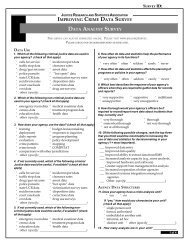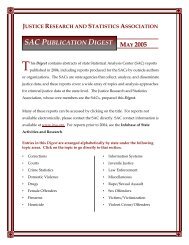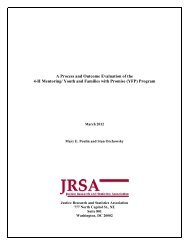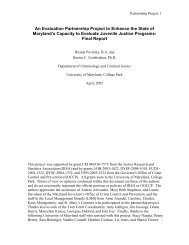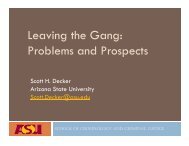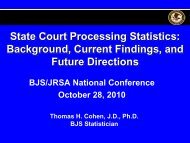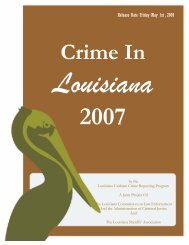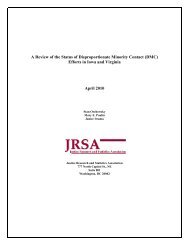Gendered Perceptions of Date Rape: Is Sex an Exchangeable ...
Gendered Perceptions of Date Rape: Is Sex an Exchangeable ...
Gendered Perceptions of Date Rape: Is Sex an Exchangeable ...
You also want an ePaper? Increase the reach of your titles
YUMPU automatically turns print PDFs into web optimized ePapers that Google loves.
<strong>Gendered</strong><br />
<strong>Perceptions</strong> <strong>of</strong> <strong>Date</strong><br />
<strong>Rape</strong>: <strong>Is</strong> <strong>Sex</strong> <strong>an</strong><br />
Exch<strong>an</strong>geable<br />
Commodity?<br />
Kristen Bugden<br />
University <strong>of</strong> Massachusetts Lowell<br />
J.D. C<strong>an</strong>didate, New Engl<strong>an</strong>d Law Boston
Introduction<br />
• Previous research has shown that 15% <strong>of</strong> female college<br />
students have been raped, 85% <strong>of</strong> the victims were<br />
acquainted with their attacker, <strong>an</strong>d 57% <strong>of</strong> the assaults<br />
occurred while on a date.<br />
• <strong>Rape</strong> is one <strong>of</strong> the only crimes where the victim’s<br />
behavior influences the amount <strong>of</strong> blame attached to the<br />
perpetrator.<br />
• The existence <strong>of</strong> a prior relationship between the victim<br />
<strong>an</strong>d the perpetrator lessens the perceived seriousness <strong>of</strong><br />
the crime.<br />
• The high incidence <strong>of</strong> victim blame <strong>an</strong>d the differences in<br />
opinion about whether a sexual act between<br />
acquaint<strong>an</strong>ces is considered rape, point to the<br />
import<strong>an</strong>ce <strong>of</strong> underst<strong>an</strong>ding observers’ perceptions <strong>of</strong><br />
date rape.<br />
(Bridges, 1991; Gillen & Muncer, 1995; Loiselle & Fuqua, 2007; Sawyer, Pinciaro, & Jessell, 1998).
Theme<br />
• The hypothesis <strong>an</strong>d central theme <strong>of</strong> this<br />
research paper was focused around the<br />
question <strong>of</strong> whether men, compared to<br />
women, view sex as a commodity that c<strong>an</strong><br />
be obtained in exch<strong>an</strong>ge for other goods<br />
<strong>an</strong>d services.
Socialization Theories<br />
• The theory <strong>of</strong> socialization has sought to explain these perceived<br />
differences in terms <strong>of</strong> learned sex role expectations, false learned<br />
beliefs about date rape (myths), <strong>an</strong>d social exch<strong>an</strong>ge theory.<br />
• Learned sex role expectations suggest that men <strong>an</strong>d women have<br />
been socialized to act along proscribed lines during sexual<br />
encounters.<br />
• Ex. A wom<strong>an</strong> may be expected to refuse her partner’s s sexual<br />
adv<strong>an</strong>ces initially <strong>an</strong>d to accept them later after repeated<br />
pressure from him.<br />
• <strong>Rape</strong> myths shift the blame for rape onto the victim <strong>an</strong>d excuse<br />
the perpetrator.<br />
• Ex. Victim masochism: “She enjoys/w<strong>an</strong>ts it”<br />
• Ex. Victim Precipitation: “She asks for it/deserves it”<br />
• Ex. Male sexuality: “If he c<strong>an</strong>’t t control his sexual urges, th<strong>an</strong><br />
it is her responsibility not to provoke him”<br />
• Social exch<strong>an</strong>ge theory states that social behavior is <strong>an</strong> exch<strong>an</strong>ge<br />
<strong>of</strong> goods, material <strong>an</strong>d non-material goods. For the amount a<br />
person gives, they expect the same amount in return.<br />
(Bridges, 1991; Check & Malamuth, 1983; Cow<strong>an</strong> & Quinton, 1997; Gillen & Muncer, 1995; Gray, 2006; Reg<strong>an</strong>, 1997;).
Quid Pro Quo<br />
• This study sought to determine whether a quid<br />
pro quo exch<strong>an</strong>ge altered perceptions <strong>of</strong> date-<br />
rape differently for men <strong>an</strong>d women<br />
• Specifically, I applied this concept by examining<br />
whether providing the service <strong>of</strong> cooking dinner<br />
altered empathy <strong>an</strong>d blame for the victim <strong>an</strong>d<br />
perpetrator in men <strong>an</strong>d women particip<strong>an</strong>ts<br />
• The idea that a female owes the male a sexual favor<br />
in return for his provided service <strong>of</strong> cooking dinner
Current Study<br />
• In this study, I compared three different service<br />
exch<strong>an</strong>ges<br />
• A service provided by the male<br />
(Male cooks dinner for the female)<br />
• A service provided by the female<br />
(Female cooks dinner for the male)<br />
• One in which no service is provided<br />
(Take-out dinner is shared)
Scenarios<br />
Scenario 1: Jim Provides the Service (Cooking Dinner)<br />
Jim <strong>an</strong>d Sus<strong>an</strong> just started dating. On their third date, Jim <strong>of</strong>fered to cook<br />
Sus<strong>an</strong> dinner at his apartment. Jim <strong>an</strong>d Sus<strong>an</strong> were having a great time<br />
together <strong>an</strong>d made good conversation during dinner. Since neither <strong>of</strong> them had<br />
to work the next day Sus<strong>an</strong> decided to stay awhile after dinner. Jim gave her a<br />
tour that ended in his bedroom. He asked Sus<strong>an</strong> to test out his mattress <strong>an</strong>d<br />
pushed her down onto the bed. Sus<strong>an</strong> resisted but intercourse followed.<br />
Scenario 2: Sus<strong>an</strong> Provides the Service (Cooking Dinner)<br />
Jim <strong>an</strong>d Sus<strong>an</strong> just started dating. On their third date, Sus<strong>an</strong> <strong>of</strong>fered to cook<br />
Jim dinner at his apartment. Jim <strong>an</strong>d Sus<strong>an</strong> were having a great time together<br />
<strong>an</strong>d made good conversation during dinner. Since neither <strong>of</strong> them had to work<br />
the next day Sus<strong>an</strong> decided to stay awhile after dinner. Jim gave her a tour<br />
that ended in his bedroom. He asked Sus<strong>an</strong> to test out his mattress <strong>an</strong>d<br />
pushed her down onto the bed. Sus<strong>an</strong> resisted but intercourse followed.<br />
Scenario 3: Service is Shared (Take-out Dinner is split)<br />
Jim <strong>an</strong>d Sus<strong>an</strong> just started dating. On their third date, Jim <strong>an</strong>d Sus<strong>an</strong> split takeout<br />
<strong>an</strong>d brought it back to Jim’s apartment to eat. Jim <strong>an</strong>d Sus<strong>an</strong> were having<br />
a great time together <strong>an</strong>d made good conversation during dinner. Since neither<br />
<strong>of</strong> them had to work the next day Sus<strong>an</strong> decided to stay awhile after dinner.<br />
Jim gave her a tour that ended in his bedroom. He asked Sus<strong>an</strong> to test out his<br />
mattress <strong>an</strong>d pushed her down onto the bed. Sus<strong>an</strong> resisted but intercourse<br />
followed.
Methodology<br />
• Particip<strong>an</strong>ts were provided a questionnaire with five scenarios<br />
depicting conflict situations where it was questionable who the<br />
responsible individual was<br />
• Twelve different versions <strong>of</strong> the questionnaire that contained<br />
different orders <strong>of</strong> the scenarios were distributed<br />
• The date rape scenario, the scenario being studied, always<br />
remained in the second position on each version <strong>of</strong> the scenarios<br />
• Particip<strong>an</strong>ts were only given one version <strong>of</strong> the date rape<br />
scenario<br />
• After particip<strong>an</strong>ts read the scenarios, they were asked to <strong>an</strong>swer<br />
questions about the two individuals depicted in the scenario<br />
• Particip<strong>an</strong>ts were given a second sheet <strong>of</strong> paper with one version<br />
<strong>of</strong> the date rape scenario, corresponding to the version they had<br />
on the first part <strong>of</strong> the questionnaire where they were asked, in a<br />
written response, about how they thought each individual in the<br />
scenario felt about the incident that occurred in the scenario
Questionnaire<br />
1. What kind <strong>of</strong> person do you think Jim is?<br />
Irresponsible 1 2 3 4 5 6 Responsible<br />
Weak 1 2 3 4 5 6 Strong<br />
Unintelligent 1 2 3 4 5 6 Intelligent<br />
2. To what degree are you sympathetic with Jim’s feelings?<br />
Low Sympathy 1 2 3 4 5 6 High Sympathy<br />
3. How much do you blame Jim for what happened in this scenario?<br />
Low 1 2 3 4 5 6 High<br />
4. What kind <strong>of</strong> person do you think Sus<strong>an</strong> is?<br />
Irresponsible 1 2 3 4 5 6 Responsible<br />
Weak 1 2 3 4 5 6 Strong<br />
Unintelligent 1 2 3 4 5 6 Intelligent<br />
5. To what degree are you sympathetic with Sus<strong>an</strong>’s feelings?<br />
Low Sympathy 1 2 3 4 5 6 High Sympathy<br />
6. How much do you blame Sus<strong>an</strong> for what happened in this scenario?<br />
Low 1 2 3 4 5 6 High<br />
7. If you had to choose one person to blame, who would you choose?<br />
Jim<br />
Sus<strong>an</strong>
Hypotheses<br />
1) When presented with <strong>an</strong> ambiguous scenario<br />
describing a forced sexual interaction, women<br />
would be more sympathetic to the victim <strong>an</strong>d<br />
more blaming <strong>of</strong> the perpetrator th<strong>an</strong> would<br />
men – <strong>an</strong>d women more likely to view the<br />
incident as a date rape<br />
2) Men would be more likely to blame the victim<br />
when the male provided the service (women’s<br />
perceptions would be unaffected to <strong>an</strong>y service<br />
exch<strong>an</strong>ge)
Preambles<br />
Composite Variable 1: Jim’s s Personal Attributes<br />
What kind <strong>of</strong> person do you think Jim is?<br />
Irresponsible 1 2 3 4 5 6 Responsible<br />
Weak 1 2 3 4 5 6 Strong<br />
Unintelligent 1 2 3 4 5 6 Intelligent<br />
Composite Variable 2: Sus<strong>an</strong>’s s Personal Attributes<br />
What kind <strong>of</strong> person do you think Sus<strong>an</strong> is?<br />
Irresponsible 1 2 3 4 5 6 Responsible<br />
Weak 1 2 3 4 5 6 Strong<br />
Unintelligent 1 2 3 4 5 6 Intelligent<br />
Composite Variable 3: Blame <strong>an</strong>d Empathy<br />
Composite Variable 3: Blame <strong>an</strong>d Empathy<br />
To what degree are you sympathetic with Jim’s feelings?<br />
Low Sympathy 1 2 3 4 5 6 High Sympathy<br />
How much do you blame Jim for what happened in this scenario?<br />
Low 1 2 3 4 5 6 High<br />
To what degree are you sympathetic with Jim’s feelings?<br />
Low Sympathy 1 2 3 4 5 6 High Sympathy<br />
How much do you blame Jim for what happened in this scenario?<br />
Low 1 2 3 4 5 6 High
Frequency <strong>of</strong> Choice Allocating Blame to Jim or Sus<strong>an</strong> in relation to group (service-provided)<br />
by Men<br />
Gender: male<br />
20<br />
Choice<br />
Jim<br />
Sus<strong>an</strong><br />
Total Number Chosen<br />
15<br />
10<br />
5<br />
0<br />
Jim Provides Service<br />
Sus<strong>an</strong> Provides Service<br />
Group<br />
Service is Shared
Frequency <strong>of</strong> Choice Allocating Blame to Jim or Sus<strong>an</strong> in Relation to Group (serviceprovided)<br />
by Women<br />
Gender: female<br />
12.5<br />
Choice<br />
Jim<br />
Sus<strong>an</strong><br />
Total Number Chosen<br />
10.0<br />
7.5<br />
5.0<br />
2.5<br />
0.0<br />
Jim Provides Service<br />
Sus<strong>an</strong> Provides Service<br />
Group<br />
Service is Shared
Jim More Responsible<br />
Equal Responsibility<br />
Sus<strong>an</strong> More Responsible
Qualitative Analysis: Sus<strong>an</strong><br />
3 most prevalent themes stated by<br />
female particip<strong>an</strong>ts regarding Sus<strong>an</strong>’s<br />
feelings about the incident<br />
1. Sus<strong>an</strong> was forced, helpless, weak, violated,<br />
afraid<br />
Ex. “I believe Sus<strong>an</strong> felt violated, she was forced <strong>an</strong>d<br />
raped. Going into a bedroom does not give <strong>an</strong><br />
invitation” – Female, age 19<br />
Ex. “She felt horrible, taken adv<strong>an</strong>tage <strong>of</strong>, <strong>an</strong>d out <strong>of</strong><br />
control in her element. She felt hopeless <strong>an</strong>d<br />
weak like she couldn’t have done <strong>an</strong>ything,<br />
regret, dirty, molested, <strong>an</strong>d broken” – Female,<br />
age 19<br />
2. Sus<strong>an</strong> feels mad at herself, blames herself,<br />
feels guilty, feels like its her fault<br />
Ex. “Sus<strong>an</strong> might have felt as though it was her fault<br />
because she stayed longer. She didn’t stop it<br />
from happening” – Female, age 18<br />
Ex. “Sus<strong>an</strong> felt violated <strong>an</strong>d stupid – <strong>an</strong>d somehow<br />
felt it was her fault” – Female, age 19<br />
3. Sus<strong>an</strong> was mad, disgusted, upset<br />
Ex. “She did not expect to be attacked on their date.<br />
Afterward, she probably felt shame, <strong>an</strong>ger, <strong>an</strong>d<br />
frustration” – Female, age 19<br />
Ex. “Sus<strong>an</strong> was scared, pissed, upset, <strong>an</strong>d she<br />
probably felt hatred” –Female, age 18<br />
3 most prevalent themes stated by male<br />
particip<strong>an</strong>ts regarding Sus<strong>an</strong>’s feelings<br />
about the incident<br />
1. Sus<strong>an</strong> was forced, helpless, weak,<br />
violated, afraid<br />
Ex. “She felt helpless <strong>an</strong>d possibly overpowered<br />
by Jim” – Male, age 22<br />
Ex. “Sus<strong>an</strong> felt used <strong>an</strong>d dirty. She had sex forced<br />
on her <strong>an</strong>d no wom<strong>an</strong> w<strong>an</strong>ts that” – Male, age 19<br />
2. Sus<strong>an</strong> was mad, disgusted, upset<br />
Ex. “She was mad, disgusted, <strong>an</strong>d rage against<br />
Jim for being such a weak <strong>an</strong>d cowardly person” –<br />
Male, age 19<br />
Ex. “Sus<strong>an</strong> was incredibly upset by it. Her rights<br />
were violated in such a personal way. It must<br />
have shaken her foundation” – Male, age 20<br />
3. Sus<strong>an</strong> really w<strong>an</strong>ted to have sex<br />
Ex. “Sus<strong>an</strong> w<strong>an</strong>ted to resist until she realized she<br />
w<strong>an</strong>ted to have sex. If she really didn’t w<strong>an</strong>t to,<br />
all she had to say was “no.” I think she allowed it<br />
to happen <strong>an</strong>d w<strong>an</strong>ted it to” – Male, age 18<br />
Ex. “She accepted her desires <strong>an</strong>d followed along<br />
with it” – Male, age 18
Qualitative Analysis: Jim<br />
3 most prevalent themes stated by<br />
female particip<strong>an</strong>ts regarding Jim’s<br />
feelings about the incident<br />
3 most prevalent themes stated by<br />
male particip<strong>an</strong>ts regarding Jim’s<br />
feelings about the incident<br />
1. Jim didn’t think about it, no regrets, didn’t<br />
care<br />
Ex. “I don’t expect him to feel much by me<strong>an</strong>s <strong>of</strong><br />
remorse; if he committed that kind <strong>of</strong> violent act his<br />
mentality is not likely one that has <strong>an</strong>ything to do with<br />
guilt. He probably doesn’t even recognize what he did<br />
as rape” – Female, age 18<br />
Ex. “Jim is a selfish, stupid m<strong>an</strong> who has no concern<br />
for others feelings” – Female, age 19<br />
2. Jim felt powerful, in control<br />
Ex. “Jim probably felt powerful <strong>an</strong>d ‘m<strong>an</strong>ly’ to violate<br />
her trust <strong>an</strong>d disregard her feelings by forcing her to<br />
have sex” – Female, age 18<br />
Ex. “Jim felt powerful <strong>an</strong>d excited because <strong>of</strong> the<br />
control he had” – Female, age 19<br />
3. Jim waited long enough, got what he w<strong>an</strong>ted<br />
Ex. “Jim was the dominating person. He was probably<br />
pleased the event took place <strong>an</strong>d he received what he<br />
w<strong>an</strong>ted” – Female, age 19<br />
4. Jim feels proud, happy, excited, pleased, good<br />
Ex. “He felt good that he had her upstairs, he was just<br />
hoping that he could get a piece <strong>of</strong> ass” – Female, age<br />
19<br />
1. Jim feels proud, happy, excited, pleased,<br />
good<br />
Ex. “Jim felt satisfied <strong>an</strong>d glad that he got <strong>an</strong>other<br />
notch on his belt” – Male, age 19<br />
Ex. “He was probably excited to have her over <strong>an</strong>d<br />
enjoyed the situation” – Male, age 18<br />
2. Jim didn’t think about it, no regrets, didn’t<br />
care<br />
Ex. “Jim probably didn’t think about the incident.<br />
They had sex – ‘nuff said” – Male, age 19<br />
Ex. “He has no regrets. If he has the guts to do it<br />
he won’t feel guilty like <strong>an</strong> assassin” – Male, age<br />
19<br />
3. Jim waited long enough, got what he<br />
w<strong>an</strong>ted<br />
Ex. “Jim probably felt like a ‘m<strong>an</strong>’ because he was<br />
able to get what he w<strong>an</strong>ted through force” – Male,
Discussion: Social Exch<strong>an</strong>ge<br />
Theory<br />
• It was hypothesized that, due to social exch<strong>an</strong>ge<br />
theory, when Jim cooked dinner for Sus<strong>an</strong>, he<br />
would expect something in return<br />
• This is partially consistent with the findings, when Jim<br />
provided the service <strong>of</strong> cooking dinner, both male <strong>an</strong>d<br />
female particip<strong>an</strong>ts rated Sus<strong>an</strong> the lowest<br />
• This suggests that both men <strong>an</strong>d women may view sex as <strong>an</strong><br />
exch<strong>an</strong>geable commodity<br />
• However, both men <strong>an</strong>d women rated Sus<strong>an</strong> lower when<br />
she cooked dinner as well<br />
• This suggests that there is more going on here th<strong>an</strong> simply quid<br />
pro quo
Additional Theme<br />
• The fact that particip<strong>an</strong>ts had the most empathy for<br />
Sus<strong>an</strong> in the scenario where the service was shared <strong>an</strong>d<br />
were more <strong>of</strong>ten to label this situation as “rape, rape,”<br />
demonstrates the increasing awareness <strong>an</strong>d decreasing<br />
accept<strong>an</strong>ce for the crime <strong>of</strong> date rape<br />
• Particip<strong>an</strong>ts written responses, rather th<strong>an</strong> express the<br />
notion that Sus<strong>an</strong> “owed” Jim for the service,<br />
demonstrated that they viewed the service as a signal<br />
<strong>of</strong> Jim <strong>an</strong>d Sus<strong>an</strong>’s s intent<br />
• Both male <strong>an</strong>d female particip<strong>an</strong>ts stated that Sus<strong>an</strong> misread<br />
Jim’s s signals, therefore placing more <strong>of</strong> the blame onto Sus<strong>an</strong><br />
• Both male <strong>an</strong>d female particip<strong>an</strong>ts felt that Sus<strong>an</strong><br />
miscommunicated her intentions, again more victim blame




